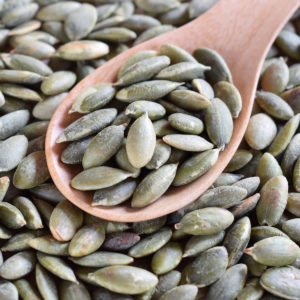Lately, I’m having a love affair with pumpkin seeds.
Pumpkin seeds aren’t new to my diet. In fact, I developed this love affair years ago while studying the Blood Type diet in nutrition school. I toasted them and snacked as I studied, hoping to reap benefits from one of the most beneficial foods (second only to pineapple) for Type A blood types like me – a habit I’ve rekindled today.
Pumpkin seeds, or pepitas, are a popular ingredient in Mexican cooking. Their use can be traced back to the early Native Americans, who revered the little seeds for their medicinal properties. So don’t toss away those seeds the next time you buy a pumpkin!
The health benefits of pumpkin seeds include:
- A rich source of dietary fiber to promote healthy bowels and help you stay “regular”
- Anti-microbial and anti-fungal, supporting good digestive health
- A good source of zinc, which will give your immune system a boost
- A brain superfood, improving cognitive function, learning and memory
- Also a powerful mood-booster
- Pumpkin seeds are one of the few seeds high in protein
- Contain copper, which supports flexibility in bones and joints
Buying and storing pumpkin seeds:
Pumpkin seeds are generally available either pre-packaged or in the bulk section of your local supermarket. They should smell sweet and nutty, not musty or shriveled. Store pumpkin seeds in an airtight container in the refrigerator where they’ll last a couple of months.
Quick serving ideas:
-
-
-
- I love dry-roasting pumpkin seeds in a low (170 degree) temperature oven for 15-20 minutes
- Sprinkle them on your favorite salad
- Chop them and add to your breakfast cereal (either hot or cold!)
- Add to your store-bought granola, or try my favorite recipe for Maple Vanilla Granola here
- For a burst of flavor, add them to vegetable dishes
-
-
This week’s Simple Action Step:
This week, experiment in the kitchen with pumpkin seeds. Already eating pumpkin seeds? Have a favorite recipe? Let us know in the comments below!




